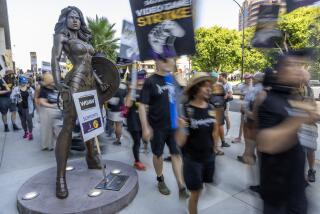A Lesson for Hollywood
- Share via
A tentative deal reached Sunday between screen actors and the advertising industry ends the longest walkout in Hollywood’s history. The six-month strike cost the Los Angeles economy an estimated $229 million directly and indirectly as production stopped or fled to Canada or Europe. What comes next could be much worse.
Up for negotiation in May and July are contracts between the major studios on the one side and feature actors and writers on the other. As the commercial actors’ walkout showed, the heat of an acrimonious strike does not encourage problem-solving on the difficult issues that the entertainment industry’s changing world presents.
Nobody--especially a Los Angeles recently roiled by transport and municipal workers’ strikes--would benefit from another round of conflict, and it is harder to muster empathy with professional actors than with bus drivers or janitors.
The strike by the Screen Actors Guild and the American Federation of Television and Radio Artists against advertisers was primarily about pay structure, particularly for commercials produced for cable TV and the Internet. Under their current contract, actors receive pay-per-play wages only for commercials that air on the networks. They get a flat fee for cable TV commercials. Although the flat fee is higher than the guaranteed minimum for network ads, the pay-per-play system is favored by actors in the long run. The advertisers wanted to abolish pay-per-play altogether and pay actors in commercials a flat fee no matter what the medium. Similar issues are expected to dominate the coming separate negotiations between studios and the actors’ and writers’ guilds.
The unions should look at the mediocre result--for actors--of the SAG strike. The actors will get a higher flat fee for ads on cable TV, but not the pay-per-play they sought. On Internet advertising, they won a pledge from advertisers that union actors will be used, but no salary numbers.
The actors lost on extending the pay-for-play principle and won only a slightly higher pay raise than the advertisers were offering weeks ago. They are unlikely to recoup all their lost wages, and some of the production that went to Canada may never return.
As for the next rounds of separate negotiations with actors and writers, the employers--the major studios and television networks--don’t have much to gain from a lengthy strike either. It would disrupt production schedules and certainly not help the image of a wealthy industry with an imperious reputation.
The SAG negotiations with advertisers began in acrimony, with a strike all but preordained. The Writers Guild, the SAG feature actors and the studios should all be able to see how little was gained by aiming for a fight from the start.
More to Read
The biggest entertainment stories
Get our big stories about Hollywood, film, television, music, arts, culture and more right in your inbox as soon as they publish.
You may occasionally receive promotional content from the Los Angeles Times.










